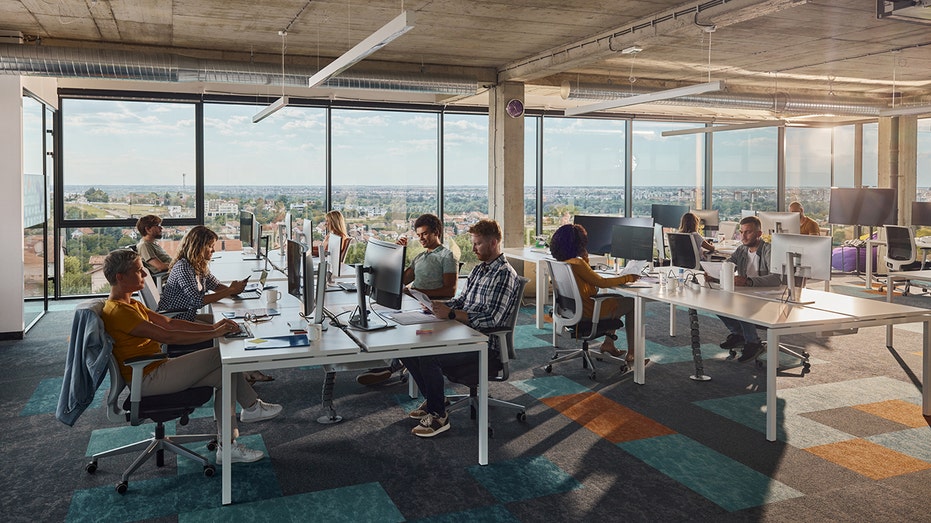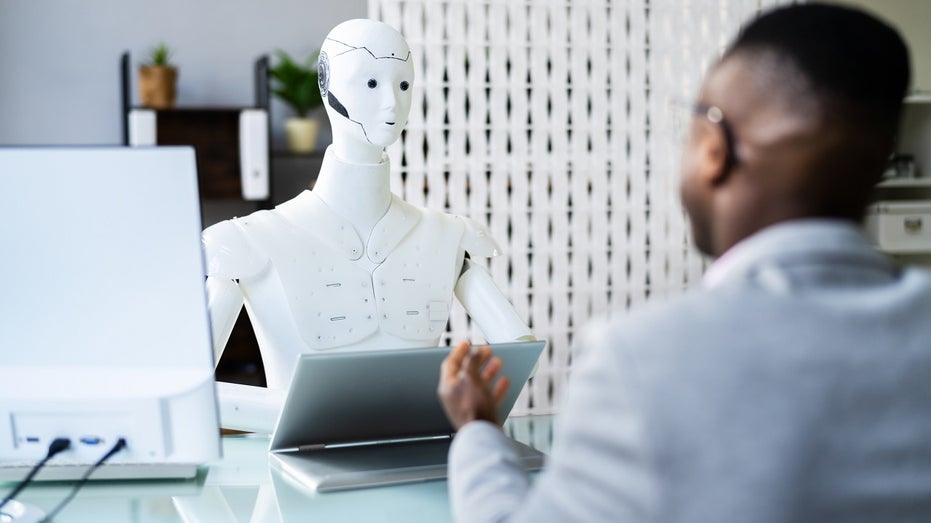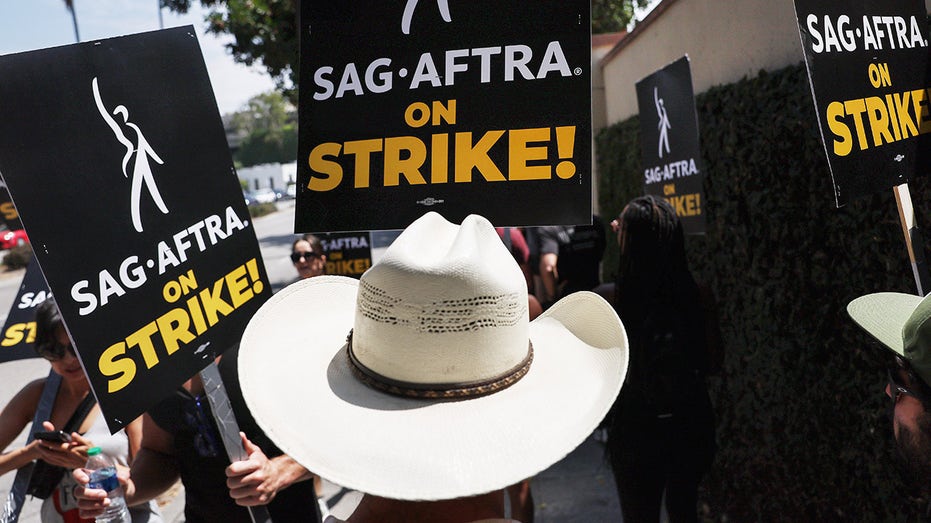AI infiltrates workplace: How everything from hiring process to staffing demands changed this year
Most employees believe artificial intelligence will eventually replace them in workplace
AI holds massive potential for good but needs guardrails: Selipsky
AWS chief executive Adam Selipsky responds to Federal Trade Commission allegations against Amazon, discusses AI innovation and breaks down Amazon's contributions to the U.S. economy on "FOX Business Originals."
The mainstream attention around artificial intelligence (AI) has brought reasonable fears about the impact of an even more pervasive form of automation in the workplace and the threat to jobs.
Public engagement with ChatGPT caught the public imagination, but as users found it eerie how much an email written by the AI program sounded like a human wrote it, they started to wonder what other office tasks AI could offload from a human worker.
The demand for AI-focused employees also jumped as every company started to look at how they could integrate AI tech into their operations.
AI will reshape the workforce in the coming years, and here are just a few ways in which it has already impacted hiring and the general workforce.
CHANGE IN AVAILABLE JOBS
The promise of AI will bring with it massive career shifts, much like those that happened when general automation shifted many blue-collar jobs in the 1970s and 1980s. What labor machines did for blue-collar jobs, AI will do to white-collar jobs, according to experts.
A survey by market research firm Censuswide found that 50% of mid-level office professionals already use AI in some form to perform tasks. What starts off as improving workplace efficiency could soon give way to job cuts.
BIG-CITY CRIME IN 2023 HAD SOME BUSINESSES SAYING ENOUGH IS ENOUGH
"While industry apologists like to claim a significant number of jobs will be created from AI, that is largely wishful thinking," Christopher Alexander, the chief analytics officer of Pioneer Development Group, told Fox News Digital. "If the types of AI envisioned for the near future won't replace workers, it would make no sense for a company to implement it."

A survey by market research firm Censuswide found that 50% of mid-level office professionals already use AI in some form to perform tasks. What starts off as improving workplace efficiency could soon give way to job cuts. (iStock / iStock)
"For the short term, it is possible many companies will simply reduce hiring as AI augmentation enhances worker productivity," Alexander said.
A Bently-Gallup Business in Society Study from September found that 75% of U.S. adults expect AI to shrink the job pool, with only 6% believing that the tech could actually help boost jobs in America and around 19% believe that jobs will remain unaffected.
SHORT-TERM SHOCKS
Jobs may not feel the immediate squeeze, but workers might find that their wages take a hit first, according to some experts.
The European Central Bank (ECB) in November determined that AI use will more likely lead to "neutral or negative impacts" on wages as a worker finds their workload decreased long before a company might outright eliminate it.
WHAT IS ARTIFICIAL INTELLIGENCE (AI)?
Workers can mitigate short-term job loss by working to master new AI tools, improve efficiency and productivity, and educate themselves on the next wave of tech innovation that will follow AI, according to Phil Siegel, founder of the Center for Advanced Preparedness and Threat Response Simulation.
Companies have posted high demand for AI-related jobs, with some listing openings for positions with salaries of around $900,000, such as a data scientist job in Los Angeles. California continues to lead the way for AI-related job openings with Texas and New York just behind it.

Jobs may not feel the immediate squeeze, but workers might find that their wages take a hit first, according to some experts. (iStock / iStock)
Californians also show the greatest interest in AI with more than 20 million searches for AI software over the past 12 months. GoTo reported that more than half of Californians are regularly searching online for AI chatbots like ChatGPT or Google's Bard, with 51.9% of AI users per 100 people.
Other machine learning-related job postings in Los Gatos, California, have the same overall market range from $100,000 to $700,000 or $449,000 to $842,000.
FACE TO FACE WITH MACHINES
Aside from the effects on job availability and wage pressure, job seekers will at some point need to confront AI, quite literally, as some companies have discussed using AI as part of the hiring process.
A Resume Builder survey found 10% of companies currently use AI interviews for prospective workers, with 43% planning to utilize the tech in their hiring process by next year. Around two-thirds of those surveyed said they expect AI to eventually replace humans in the hiring process.
WINNERS AND LOSERS: THE TOP STATES PEOPLE MOVED TO AND FROM IN 2023
How the companies plan to utilize AI in the process remains murky at best, with 80% saying they most likely would use the tech to screen out qualified candidates and only 15% would allow AI to make unilateral decisions.

IBM CEO Arvind Krishna predicts that many jobs will be cut due to AI in the next five years. (iStock / iStock)
"Most managers in our survey agree that it will most likely eliminate candidates that a human or ATS may not but seem to be using anyway in an effort to speed up the hiring process," Stacie Haller, Resume Builder’s chief career adviser, told FOX Business.
"Time will tell if this really accomplished the end goal of hiring the best candidates for the position or eliminates great candidates and moves forward more unqualified candidates, resulting in turnover," she added.
LABOR NEGOTIATIONS
AI in the workforce came under sharp focus in one of the most surprising labor disputes: The Hollywood writers and actor strikes, which fought against the apparent inevitability of AI in their workplaces with seemingly mixed results.
BIDEN ANTI-CONSUMER CRUSADE TARGETS 4 MORE TYPES OF APPLIANCES
The strikes, which lasted 148 days for the writers and 118 days for actors, pushed back against measures that would allow studios to use AI to generate scripts for television and movies or to recreate the likeness of actors for various projects, both of which would reduce costs at various levels of production.

SAG-AFTRA members were on strike for four months. (Mario Tama / Getty Images)
Studios had already barreled ahead with significant increases in AI expert staffing, with companies like Netflix looking to use machine learning to "increase the leverage" of the platform across the company.
One notable AI and machine-learning listing from Disney’s careers website is for a senior vice president role related to postproduction and innovation for Disney Branded Television, which produces content for children and families.
CLICK HERE TO READ MORE ON FOX BUSINESS
The results, which included some concessions to AI’s introduction and its increasing usage in both writing rooms and on sets, show that AI will find its way into every industry and that it's only a matter of time.
FOX Business’s Michael Lee and Julia Musto contributed to this report.





















